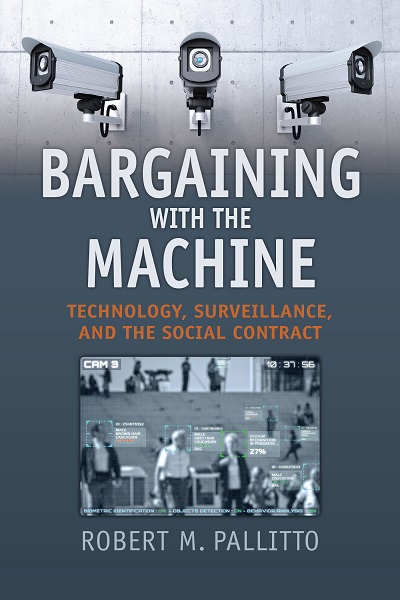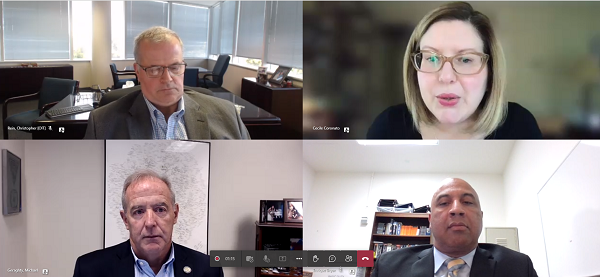Seton Hall Professor’s Book Questions Tradeoffs People Make When They Use Technology
Seton Hall professor Robert Pallitto researches the intersection of technology and society. His latest book examines the daily compromises individuals make with technology, asking whether resisting is even possible when the technologies in question are backed by persuasive or even coercive corporate and state power.
The book explores the privacy dilemmas we face when using social media, shopping online, and submitting to biometric scans. Do we really have a choice about surrendering personal information? What do such encounters tell us about the state of our liberties under the modern social contract? These are the questions posed by Pallitto, Ph.D., J.D., who is a professor of political science in the Department of Political Science and Public Affairs, in the College of Arts and Sciences.
Following is an email interview with Pallitto about his book and why he wrote it.
What is the name of your book?
The book, which was released in August 2020 by the University Press of Kansas, is called “Bargaining with the Machine: Technology, Surveillance, and the Social Contract.” I am the sole author.
Tell me about your background.
I am a former public interest lawyer who obtained a Ph.D. in political theory and entered academia. I study problems at the intersection of law and politics. This is my fourth book. I am interested above all in addressing contemporary social/political problems and understanding their effects on people’s lives.

How did you get the idea for this book?
I have been thinking for a long time about the problem in political theory of people acting against their own interests. After years of exploring ideology theory in relation to this problem, I thought it would be better to use an agent-centered theory (bargaining) rather than a collectivist one.
How did you go about gathering material for this book?
I read widely in contemporary political thought, philosophy of technology and surveillance studies, as well as press coverage of surveillance and privacy.
Why were you the right person to write this book?
My background in law and political theory, and my years of experience reading and thinking about this problem, situated me uniquely well to write the book.
Who is the audience you hope to reach with this book?
Privacy theorists, surveillance studies scholars and anyone who is concerned about the privacy harms associated with technological progress. The book is meant to be accessible to a wide range of readers.
Why do you think this book is important to members of the tech or entrepreneurship community in New Jersey?
I write from a philosophical perspective about things that people do every day, asking readers to question their often taken-for-granted engagements with technology.
Is there anything else you want people to know about this book?
It is related to the emerging field of surveillance studies, a relatively new and critically important area of inquiry.
What are some great quotes from the book?
- “Promises of convenience and efficiency become touchstones of irresistible bargains, inducing people to embrace various forms of technology despite the privacy risks and other social harms that those technologies pose. As a result of consumers’ endless search for greater convenience and efficiency, data collection and other surveillance practices have become more pervasive. Taking stock of the growing scope and sophistication of data collection, one might think that not only the individual convenience-driven bargains themselves, but also an entire society structured by data collection practices, is irresistible” (p. 19).
- “The benefits of convenience and efficiency are widely celebrated. Advertising spots promise savings of time and money and tout the advantages of doing banking from a mobile phone and storing data on ever-smaller devices. Such messaging spurs an endless search for more advanced convenience and ever-greater efficiency. Individuals respond affirmatively to these promises out of a combination of “fear, familiarity and fun,” according to [David Lyon in The Culture of Surveillance] There’s nothing inherently wrong with convenience, of course. And some conveniences are vital in life-and-death terms, such as laser surgery, wearable insulin pumps, or machines that constantly monitor blood pressure and heart rate in a hospital room (making it unnecessary for the attending nurses to get up repeatedly and take readings). The question, rather, is whether convenience or efficiency has eclipsed other important values, such as privacy, autonomy, dignity, or even safety. Trade-offs between these values can happen knowingly and deliberately, or they can be so poorly understood that their harmful consequences are unanticipated” (p. 25).
- “Technological forms are ubiquitous, confronting us seemingly at every turn. Time and again, we must decide whether to engage or avoid them. The sheer number of such encounters makes it difficult to refuse engagement in any sustained way, since one choice follows so closely on another. This ubiquity suggests another way in which technological engagement may be irresistible. Paired with ubiquity is obscurity, as we remain unaware of how the ever-present technological artifacts surrounding us actually operate. In particular, we do not notice the sites at which personal information is extracted from us, nor do we see how those extractions cause us to lose control over the information” (p. 48).
- “The life-world has become increasingly networked as (1) more of our activities are subject to monitoring and reporting (even by our own design, as with fitness watches), and (2) the monitoring of activities is interconnected by the firms offering IoT technologies and the sharing of data among those who collect it. As noted in the preceding chapter, it is simply more difficult to navigate the world we live in without encountering data collection points. Thus, the networked life-world is another phenomenon that contributes to the irresistibility of the surveillance society” (p. 69).
Do you have some takeaways or lessons from your book you’d like to share?
- We make bargains every day in which we agree to engage with technology. Some such bargains involve privacy costs that we do not understand.
- Some of them are so exploitative and unequally derived that they are not bargains at all.
- Even knowingly and voluntarily chosen bargains that are good for an individual are nonetheless bad for the larger society.




